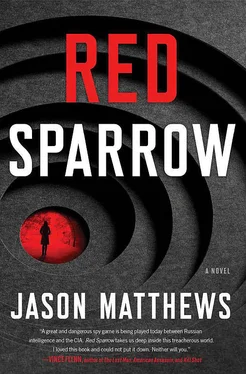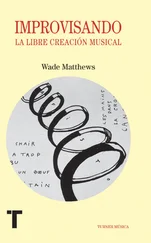Her footsteps were loud in the night air; the city was quiet. Who was Nate’s agent? she wondered. Why was he betraying Russia? Was this man or woman decent? Venal? Treacherous? Noble? Crazy? She wanted to hear his voice, watch his face. Could she ever sympathize with his motives? Could she ever justify his treason? She thought about her own pettish transgression. You rationalized that easily enough, haven’t you, zagovorshica, you great conspirator?
Dominika closed her eyes and leaned against the wall of a darkened building. Right now she was the only one who suspected—no, knew —that Nate would be meeting his agent, the mole, and she felt light-headed. What if she said nothing? What if she denied Them the knowledge and the power to win this gambit? Could she be this disloyal?
She thought of how her foot had been ruined by that tart Sonya. She remembered the green-agony scream in the shower room at the AVR. She flashed to the orange overhead light as a helpless Delon withered before the thugs, and remembered the taste of Ustinov’s blood in her mouth. And she saw Anya’s milkmaid face choked blue.
Let them wait, she decided, determination welling up inside her. This would be horribly dangerous, potentially fatal. Her resolve was fragile, exquisite, forbidden—the power she would wield over Volontov and Uncle Vanya would be real. Her mother was always telling her to control her temper, and now the icy bite in her throat was exhilarating.
She began walking again, her heels clicking on the sidewalk. There was something else, a realization that surprised her. She knew enough about the Game to know that Nate would be destroyed, his reputation obliterated, if he lost his agent. She replayed their time in Helsinki. She would not do that to him, thinking how much Nate was like her father, how much she liked him.
=====
The next morning, sick to her stomach, she showed her pass at the embassy front door, walked across the courtyard, and climbed the marble steps to the attic, steps worn smooth by countless officers who had served before her. Sluzhba Vneshney Razvedki, the Foreign Intelligence Service. At the top of the stairs was the massive vault door on massive hinges, then the day door with the cipher lock, then the privacy wire gate with the electric keypad. She put her purse down on her desk, nodded to a colleague. Volontov stood at his office door, beckoning.
Dominika stood in front of his desk, unable to take her eyes away from his doughy hands. “Any developments to report, Corporal?” asked Volontov. He was cleaning his nails with a letter opener. Her heart was racing and the pounding in her head would not stop. Did it show? Did he know something? She heard her voice in her head, as if someone else in the room were speaking.
“Colonel, I have discovered that the American seems to favor museums,” said Dominika. Her voice sounded wooden. “I have invited him to the Kiasma art gallery soon. I plan to have dinner afterward… in my apartment.” What was she saying? The very thing Volontov wanted to hear. Volontov looked up from his manicure, grunted, then stared at her breasts.
“It’s about time. Make sure you entertain him so he will want to visit you again,” he said. “You haven’t seen anything out of the ordinary?”
Three words— Yes, I have —and the machine would take over, her responsibility would be over. A simple sentence— He said he is busy the next two weeks —was all that would be necessary. The roaring in her ears grew louder and the edges of her vision clouded. Dominika could barely make out this hog behind his desk, wrapped in his dingy orange haze. Her throat closed and she was amazed to feel her legs tremble, knees actually knocking, quite extraordinary, and she resisted leaning against the desk, willed herself to stop. Volontov continued looking at her chest, a wing of pomaded hair sticking out from the side of his head. In the last millisecond, Dominika decided.
“There’s nothing to report at this time,” she said, heart pounding. She had stepped across the line separating being guilty of an infraction to committing treason against the State. They would find out, they would send men with ice picks to stab her to death like Trotsky. They would roll her mother into a furnace. Volontov looked at her for a moment, grunted again, and waved her out of his office. In a flash, Dominika knew he suspected nothing. She was sure of her instincts and felt the ice in her veins, tingling.
Dominika returned to her desk, sat heavily in her chair. Her hands were damp and shaking, and she looked around the room at the officers and secretaries at the other desks. All had their heads down, reading, typing, or writing. Except Marta Yelenova, sitting at a desk two across from Dominika’s. Marta was holding a cigarette, staring at her. Dominika smiled thinly and looked away.
Marta, Dominika supposed, was the closest thing she had to a friend in the Embassy. She was the senior administrative assistant in the rezidentura. They had spoken in the office occasionally, had sat next to each other during a dinner for some unknown embassy colleague. They had met one rainy Sunday for a walk along the harbor and among the fresh food stalls in Market Square. Marta was elegant, aristocratic, about fifty, with thick brown hair that she wore down to her shoulders. She had dark, prominent eyebrows over the most striking hazel eyes. Her fine mouth tended to turn up at the corners in a wry smile that hinted at an unshakably cynical view of the world. She was one of those with strong color about her head and body, a deep ruby red of passion and heat, a red as when Dominika listened to music.
Dominika thought that Marta must have been a beauty in her youth. She rounded on any man in the office who made even the slightest comment about her Junoesque figure, now a little thick around the waist, sending him scuttling for the exit. Marta was not in the least fazed by Rezident Volontov, characteristically telling him that he would get the voucher, or the accounting, or the monthly report, when she finished it. Volontov could not dent her Olympian aplomb.
=====
Dominika previously knew nothing about Marta’s life, but if she had, she would have been amazed to learn that Marta Yelenova had, in 1983, been conscripted by the KGB to attend State School Four—Sparrow School—in the forest outside Kazan. She was twenty years old. Her father had fought in the Great Patriotic War, then became an NKVD guard at the Leningrad headquarters, a party member, a loyal vassal of the State. Marta’s heartbreaking beauty had been noticed by a KGB major from Moscow making an inspection tour, and he arranged for her to be hired into the Service as, he originally hoped, his special assistant. Marta’s father, who knew the game but nevertheless hoped for a better life for her, said nothing, and sent his only daughter to Moscow to live with his sister and to begin work in the KGB’s Second Chief Directorate (internal security), Seventh Department (operations against tourists), Third Section (hotels and restaurants). The Seventh Department alone employed two hundred officers and sixteen hundred part-time informants and agents.
Now in Moscow, it was inevitable that Marta would be noticed by an SCD colonel, who outranked the major, and who assigned her to his staff. She was subsequently noticed by an SCD general, who outranked the colonel, and who made her his adjutant, even though Marta had no idea what an adjutant’s duties entailed. She found out when the general one afternoon forced her down on the divan in his office and put his hand under her uniform skirt. Marta hit him on the side of the head with a (typically Soviet) steel water carafe. The resultant scandal in the strangely puritanical KGB was exacerbated by the fact that the general’s wife was the sister of an alternate Politburo member. Marta was hurriedly transferred to State School Four. She had no choice. Marta was going to learn to be a Sparrow.
Читать дальше












